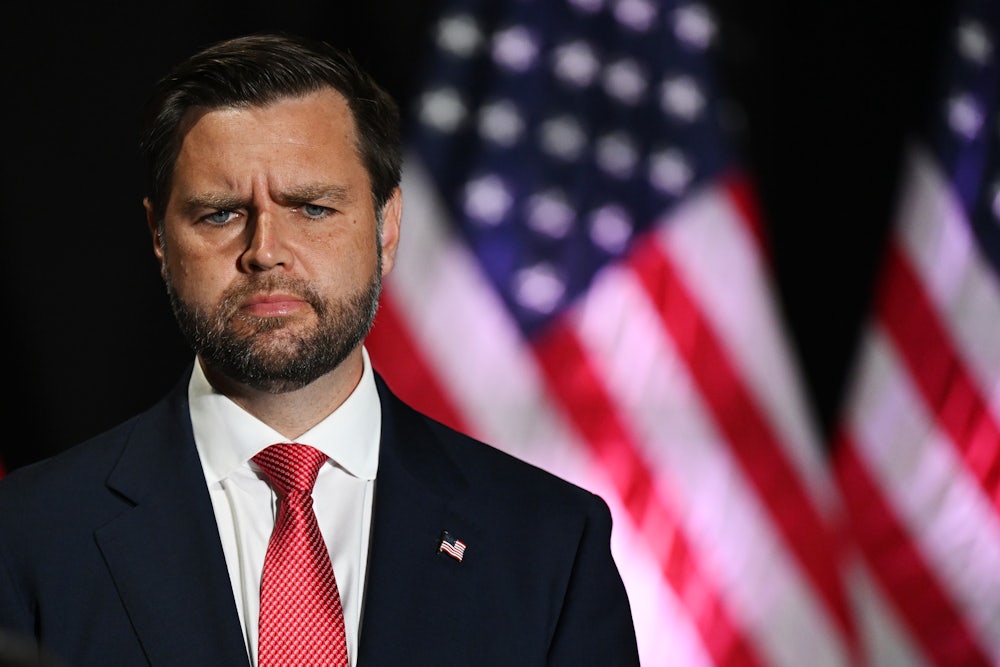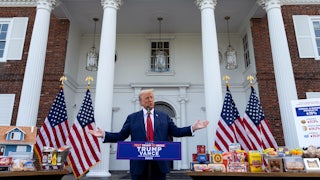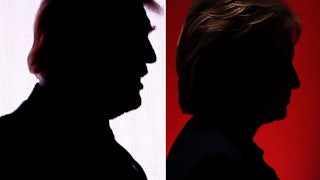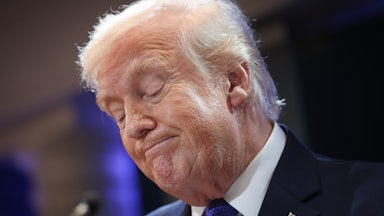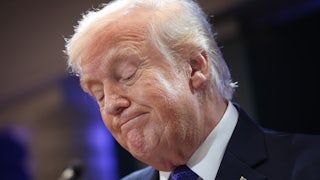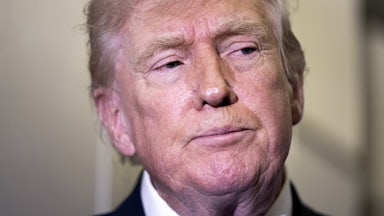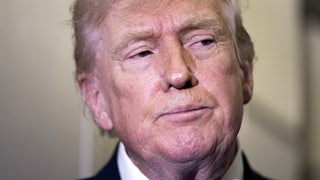No vice presidential running mate in recent memory has been scrutinized in quite the way that J.D. Vance has. Because he presents himself as an intellectual standard-bearer of the MAGA movement—and has a long trail of public statements that crystallize the movement’s views in rather colorful terms—scrutiny of Vance has gone well beyond the usual oppo-research digging, resulting in unusual media curiosity about his genuinely held philosophy and worldview.
That’s why a major new poll of the two vice presidential candidates is so notable. The survey—which breaks down public perceptions of them in demographic detail—suggests Vance’s style of right-wing populism may have a long way to go to achieve the broad-based appeal that its proponents have long hoped for. It’s often said that Trump chose Vance to maximize the ticket’s appeal to non-college white voters, but doing so may come at a steep price with other voter groups among whom Trump must improve if he wants to win.
The poll—from The Washington Post, ABC News, and Ipsos—finds that overall perceptions of Vance are far more negative than those of Governor Tim Walz. While 42 percent of Americans view Vance unfavorably and 32 percent view him favorably—putting him 10 points underwater—Walz is viewed favorably by 39 percent to 30 percent. That’s a net difference of 19 points.
Even more striking is how various groups see Vance:
- He is viewed favorably by only 24 percent of independents, versus 39 percent unfavorably.
- He is viewed favorably by only 23 percent of self-described moderates, versus 41 percent unfavorably.
- He is viewed favorably by only 22 percent of 18- to 39-year-olds, versus 44 percent unfavorably.
- He is viewed favorably by only 32 percent of women, versus 40 percent unfavorably (interestingly, Vance fares a tad worse among men).
- He is viewed favorably by only 28 percent of Hispanics, versus 39 percent unfavorably.
- He is viewed favorably by only 9 percent of Blacks, versus 50 percent unfavorably.
- He is viewed favorably by only 32 percent of suburbanites, versus 42 percent unfavorably.
- He is viewed favorably by only 33 percent of college-educated whites, versus a striking 55 percent unfavorably.
By contrast, Walz is viewed positively on net by those groups—though his favorable ratings are clearly not high enough among them yet.
Unsurprisingly, Vance is viewed positively by non-college whites (+9 points), rural voters (+13 points), and white evangelicals (+37 points). This is the trade-off that Trump made in picking Vance: Brimming with certainty that he would win by a landslide before Vice President Kamala Harris became the Democratic candidate, Trump chose a running mate who would juice his base, with little concern about his lack of appeal to voters outside it. That hubris, a key weakness of MAGA, has, by encouraging the Vance pick, seemingly produced a serious mistake.
This trade-off was not supposed to be necessary. After Republican Glenn Youngkin won the 2021 Virginia gubernatorial race on a propagandistically named “parents’ rights” platform, some right-leaning thinkers began dreaming that strategically packaged, right-populist anti-woke politics might gain serious ground among constituencies outside the core MAGA coalition. Vance is supposed to be this project’s next big success.
Indeed, Vance-style right populism is supposed to help cement a whole new Republican and center-right coalition, as Brian Beutler details in a good piece. In this account, the Democratic Party has been taken over by woke leftism, contempt for “traditional” families, and radical ideas on immigration and crime. That created an opening for a right populism that unabashedly defends draconian immigration restrictions on communitarian and nationalist grounds and uses aggressive government policy to promote large “traditional” families and privilege them over non-“traditional” ones. Pair that with renunciation of the GOP’s standard pro-plutocrat, anti-worker agenda, and you’ve got a winning formula—or so the theory went.
There is evidence that perceptions of progressive excess in the Democratic Party may have caused some erosion among certain nonwhite working-class constituencies. But now the full range of Vance’s own extreme views is emerging. His immigration skepticism has shaded into forms of “great replacement theory.” His views about the virtues of childbearing have curdled into a demand that All Good Citizens must contribute many more birth children toward solving long-term demographic woes, which apparently cannot be addressed through immigration, managed judicially in the national interest.
True, Vance probably would not tweet something quite like this:
Import the third world
— Trump War Room (@TrumpWarRoom) August 13, 2024
Become the third world pic.twitter.com/MVawiHQSpm
… but Trump’s campaign did, and as Beutler points out, Vance is more or less on board with the underlying vision it represents. All these tropes—dramatically slashing immigration, propelling women into maximal childbearing, unleashing culture-war fury on non-“traditional” families—interlock into something larger than the sum of its parts, a form of ethnonationalist natalism. Those who don’t agree that those elements are critical to maintaining their chosen vision of our country’s long-term identity, strength, and vitality—and don’t do their part in that regard themselves—are shirking their highest duty to the nation.
Many non-MAGA voters—especially among Latinos, moderates, independents, suburban women, and so forth—are probably reachable with certain right-leaning arguments about crime, border disorder, and woke excesses. But the ethnonationalist-natalist vision of our citizenship duties goes too far, and surely alienates them as well. When Democrats denounce Vance as “weird,” it’s shorthand for disgust at that worldview—and large swaths of those constituencies likely agree.
To be fair, Vance has more time to improve his image, as large percentages of voters still have no opinion of him. But, his “weirdness” aside, there’s no denying that he is a very articulate and capable spokesman for MAGA’s various ideological obsessions. And so, if he cannot sell these ideas in an attractive way, it doesn’t bode well for those dreaming that they will one day gain wider appeal.
